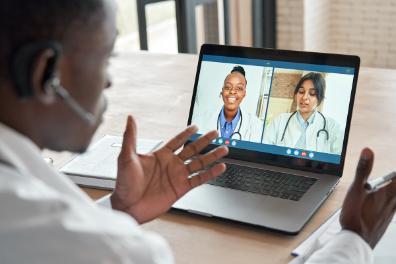Institute News
Addressing the Developmental Needs of Very Young Children & their Families is Focus of SSW Institute Grant
 The Institute for Innovation and Implementation at the University of Maryland School of Social Work, in partnership with the Maryland Chapter, American Academy of Pediatrics (MDAAP), has been awarded a 5-year, $646,878 grant to establish the TREEHOUSE Program in Maryland. The grant was recently awarded by the U.S. Health Resources and Services Administration’s Healthy Tomorrows Partnership for Children Program.
The Institute for Innovation and Implementation at the University of Maryland School of Social Work, in partnership with the Maryland Chapter, American Academy of Pediatrics (MDAAP), has been awarded a 5-year, $646,878 grant to establish the TREEHOUSE Program in Maryland. The grant was recently awarded by the U.S. Health Resources and Services Administration’s Healthy Tomorrows Partnership for Children Program.
The TREEHOUSE Program is an expansion into telehealth of the existing TREE program, a clinical service that promotes positive parenting, parent-child interactions, and social-emotional well-being through interactive, developmental telehealth coaching provided by pediatric providers to underserved families with children ages 0-2.
Margo Candelaria, PhD, is the principal investigator for the TREEHOUSE Program and co-director of the Institute’s Parent, Infant, and Early Childhood Program. She expressed her enthusiasm for this important collaborative effort; “I’m very excited to expand our ongoing work with the MDAAP and expand TREE’s positive impact on underserved families within primary care to the telehealth environment throughout the state of Maryland.”
The Program increases access to quality preventive care and services to promote health equity and enhances population health among very young children, and their families, in underserved, low-income communities by: 1) increasing pediatric provider capacity to address patient developmental and social-emotional needs; 2) improving the quality of parent-child interactions; 3) increasing knowledge of and referral to community-based resources to support families; and, 4) strengthening cross-agency partnerships to create an improved system of support for families with young children.
“We are excited for the opportunity to grow our partnership with the national and Maryland offices of the American Academy of Pediatrics and see the deep value of expanding our early childhood mental health into the primary care and telehealth setting,” said Michelle Zabel, MSS, assistant dean and director of the Institute. .
The goal of the TREEHOUSE program is to train an estimated 45 pediatric practices to provide developmental telehealth coaching to 450 low-income (Medicaid-enrolled) families with young children across a 5-year period. This strategic intervention serves to expand the ability of parents to support the learning and social-emotional growth of their very young children. Coaching will be delivered utilizing a Quality Improvement Data Aggregator learning model, developed with the American Academy of Pediatrics Section on Quality Improvement, with continuing education credits. This model allows providers to enter data and receive real-time feedback.
“This grant creates a real opportunity for pediatric practitioners to learn to provide a universal intervention for parents of young children living in under resourced communities to help improve their developmental trajectory,” states Ken Tellerman M.D., a general and developmental behavioral pediatrician in Baltimore City who chairs the MDAAP Emotional Health Committee and originally developed the TREE Program.
The TREEHOUSE Program also includes a statewide Advisory Board composed of representatives from the Maryland Department of Health’s Maternal and Child Health Bureau, the Maryland State Department of Education, family members, general and developmental pediatricians, and local and state organizations that serve and advocate for families with young children with the intention of growing statewide and local partnerships leading to increased referrals to family services.
###
The Institute for Innovation & Implementation (the Institute), founded in 2005, is a part of the University of Maryland School of Social Work. The Institute is committed to building research-based, inclusive, culturally responsive, and transformative child-, youth-and family-serving systems and services, and to developing the capacity of the workforce within these systems. We do this work in partnership with government agencies, health care providers, youth and their families, and community-based organizations in order to improve outcomes for and with children, youth, and their families.
The Maryland Chapter, American Academy of Pediatrics (the MDAAP), founded in 1950, has a long and distinguished history of legislative advocacy and providing clinical support of Maryland’s children and adolescents and their healthcare needs. Through collaborative and creative programming with public and private agencies and organizations throughout the State, the MDAAP continues to be a positive change agent in the lives of Maryland’s children and adolescents.
SHARE THIS ARTICLE:


